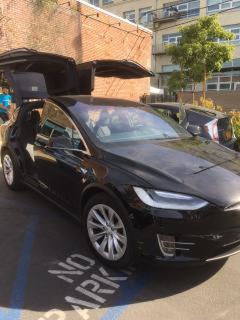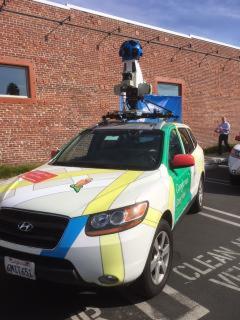Self-driving Electric Cars Are Changing the American Automotive Industry and Create New Opportunities for Czech Companies
29.11.2016 / 19:58 | Aktualizováno: 23.02.2017 / 17:19
American automotive industry is significantly influenced by the commercialization of new technologies (such as autonomous steering, connected car, electro mobility etc.) as well as by the new approach to mobility based on individual on-demand transportation. These facts bring risks for existing manufactures as well as new opportunities for companies that were outside the automotive industry until now.
New opportunities appear especially in the area of autonomous technologies (hardware and software), informative technologies (software for processing big data, artificial intelligence, 3D maps), infotainment and applications for interface human – machine, software including anti-virus protection, secured communication. Besides technologies for the operation of autonomous vehicles there is an assumption that autonomous steering will enable the formation of brand new forms of services connected with these technologies, respectively with mobility, such as the entertainment or work in the vehicle, advertisement, e-shops or new form of logistics services. There will also be new opportunities in the area of development of infrastructure for enabling the most convenient way of charging of electric cars and in the area of storing energy, respectively batteries.
There are more than 260 million passenger vehicles in the United States and an automobile is considered to be an inherent part of American lifestyle. More than 90% of Americans commute to work every day by car and only 5% of them use public transportation. More than 60% of U.S. households have two or more cars. The manufacture of cars, its sale and related industries provide work for more than 7 million Americans. In 2015, there were more than 17, 5 million personal cars sold, while there were 12 million cars manufactured in the US.
Despite these positive numbers, American automotive industry faces a number of significant problems. These could be connected either with the emergence of autonomous technology and the pressure to better connection of vehicles with the Internet, or with the development of electro mobility, as well as with the expansion of instant transportation services, such as UBER or LYFT, that can change the American approach to the private ownership of vehicles.
Autonomous vehicle = the next big thing
Autonomous technologies are considered to be the „next big thing“ in the American automotive industry. Their impact is likened to such revolutionary moments as the introduction of moving assembly line by Fort T that made an automobile available for general population. There are around 20 companies working on the development of autonomous vehicles. These include established automakers as well as technology companies and global players as well as start-ups. Companies are looking for new partnerships; test cars drove 3 milions of miles and started to be implemented in full operation. Manufactures compete who will be the first one introducing fully automated automobile in the market. Some manufactures also offer highly sophisticated assistance systems that already have some functions expected from fully autonomous vehicles. According to visionary Elon Musk, all hardware is now available and the only thing missing is enough sophisticated software, respectively artificial intelligence and maps in high resolution.
The operation of autonomous vehicles will be dependent on secured access to cloud services, smart infrastructure and updated 3D maps that definitely provide room for subcontractors of these services, as well as for companies that will be able to utilize the data obtained for remote maintenance of the vehicle, for looking for the most effective forms of utilization of cars, or for finding the most optimal routes etc.
The deployment of autonomous technologies comes with risks, particularly in the area of cyber security. This fact brings with new opportunities for anti-virus companies that can introduce products for this specific area. Autonomous technologies also create new space for the utilization of the time of transported passengers, that could be the basis for the development of infotainment, on-board electronic, and tools and application that could help spending the time in the vehicle effectively. That will also require more emphasis on interior design. According to Goldman Sachs, more than 50% of drivers would nowadays be rather listening to the music, calling on the phone, watching video or surfing on the Internet than driving.
New levels of connection of cars between each other can provide a foundation to brand new services based on geolocation and information about commuters, e.g. in the area of e-commerce including the booking of hotels, targeted advertisement (sales and promotions in the area), delivery services, and social communication through human machine interface. Autonomous technologies are not limited only to personal transportation, but are going to be expanded into truck transportation as well. They can make logistic services more effective and ensure constant workload as well as the most optimal route for specific vehicle.
Onset of electro technology
The United States of America have the largest fleet of electric cars in the world (500,000) and create 30% of world´s electric car market. Almost one third of this amount comes from California.
There were almost 116,000 electric cars sold in the USA, which is 0, 91% out of 17, 5 million cars sold. Vehicles with hybrid drive have less than 2% share of total car sales. In total, there are more than 20 models of electric cars and almost 60 models of hybrid cars.
There are 15,000 of charging stations available in the United States with more than 36,000 connections. This network expands very quickly – charging stations are created by municipal factories as well as by private providers. Wireless charging is considered to be highly desired in the future.
On federal level, there was a special initiative announced in 2016. The initiative connects 50 institutes, utilities, private firms and universities that should release 4, 5 billion U.S. dollars in the form of guarantees on loans. In some American states (e.g. California from 2015), there is also special obligation to provide a basis for power source in all newly built parking lots and garages.
Electric cars that are nowadays available usually have very short operating range. That’s why; there are many federal as well as private initiatives that are focused on further expansion of batteries and super charging systems. The partnerships in this area are established by all leading vehicle manufactures and technology companies. This could definitely be considered as an opportunity for Czech companies focusing on battery development and energy storage.
Although, there is a minor market share of electric cars in the United States, there is an assumption that the development of electric cars can help the expansion of on-demand transportation in the near future. Even electric cars that are available today, are able to provide almost 90% of all average trips of American citizens and only for 10% of trips, there would be a need for a vehicle with combustion engine. Availability of immediate delivery of vehicle with long operating range in the form of simple on demand order through mobile app could make a breakthrough in electro mobility.
Marino Radačič, Trade Commissioner, Consulate General of the Czech Republic in Los Angeles









